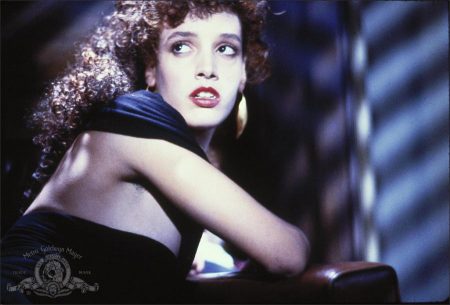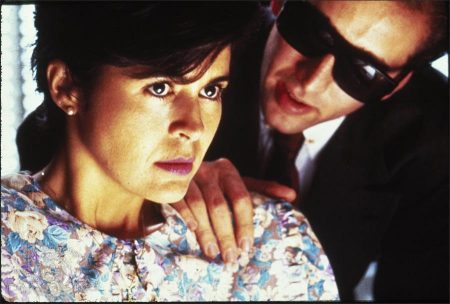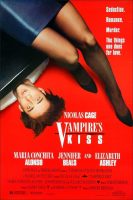Vampire’s Kiss is going to confuse the hell out of the future archeologists who dig it out of the post-apocalyptic dirt. I imagine they’ll spend hours poring over it in total disbelief and wonder if anything like Nicolas Cage’s character could have possibly existed.
Hell, we’re only 26 years removed from it, and I’m guessing it might befuddle the uninitiated and lead them to believe we once made contact with an alien race called Yuppies. The truth is that the 80s just had very potent drugs and gave birth Crazy Cage, the latter of which obviously explains Vampire’s Kiss, arguably the alpha point of the phenomenon.
While Cage had been eccentric before 1988, he’d never quite reached the glorious heights to which he ascends as Peter Loew, an overtaxed literary agent. He may or may not be going insane: his visits with a therapist (Elizabeth Ashley) reveal him to be rather peculiar, and that’s before his admission that he’s aroused when a bat interrupts him and his girlfriend having sex (Kasi Lemmons). Soon thereafter, he’s visited by a sultry, enigmatic seductress (Jennifer Beals) he believes to be a vampire. Naturally, he begins to assume that he is becoming one as well and begins to act accordingly, much to the utter bewilderment to everyone surrounding him.
With a premise like that, it’s easy to assume that Vampire’s Kiss positions itself as a sort of B-side to Once Bitten, and I daresay it’s earned that kind of reputation by virtue of being pretty under-seen since its release. In reality, it departs rather sharply from its vampiric counterpart: where the Jim Carrey vehicle is a teenage sex romp with fangs, Vampire’s Kiss is a bleak, surreal black comedy in the vein of After Hours, a film that shares screenwriter Joseph Minion’s oddball inclinations. A disturbing but amusing portrait of madness set amidst the backdrop of corporate America, it’s a wry takedown of boardroom culture. It’s American Psycho by way of Martin, with Patrick Bateman re-imagined as an impotent, wannabe bloodsucker.
Needless to say, Vampire’s Kiss is a strange beast, and that’s not even taking into account how batshit (pun intended without the slightest apology) Cage is. In one of the most singularly unconventional turns imaginable, Cage crafts Peter Loew into an indelible figure: affecting an accent that falls somewhere between Valley Dude and English Lord, Cage blisters through the film with the sole purpose of confounding everyone who beholds him.
The MVP of Vampire’s Kiss is anyone who managed to share a scene with him without absolutely losing their shit. What’s great is how calculated it is, though: Vampire’s Kiss is a story about a man slowly unraveling, and Cage layers his performance with several layers of tics and mannerisms. By the end of the film, he’s transformed from a twitchy yuppie to Max Schreck, all hunched over and stalking his prey within neon-tinted discos.
So much of Cage’s turn gravitates towards his Looney Tunes facial expressions, but the entirety of his physical performance is remarkable. He cuts a ridiculous figure even when viewers don’t have to glimpse his false vampire teeth. As he continues to stagger down a dark path that leads him to holding deranged conversations with himself, it’s completely absorbing in the same way a car crash is. You want to take it in but only with your fingers shielding your eyes. A lesser performer might have over-acted this role into smug, self-aware mugging or injected Loew with some undeserved pathos.
Cage, on the other hand, knows exactly what he’s doing: he’s comedic but somehow not funny, operatic but not tragic. Peter Loew can’t be a sympathetic figure, not after he spends most of the film berating and assaulting his poor secretary (Maria Conchito Alonso) before killing an unsuspecting girl in a night club; yet his death also doesn’t feel like deserved comeuppance because he somehow senses that he must be extinguished, going so far as to fashion his own stake. He’s a martyr, only his gospels involve boardroom misogyny banal office chit-chat. For him, love is a battlefield he expects to dominate; when those expectations go unmet, he rages with the petulance of a thwarted teenage boy, his only ammunition hormones and misguided entitlement.
What a strange snapshot of the 80s this is. Save for some musical and fashion flourishes, it doesn’t extensively mark itself like many of its contemporaries, but there’s no mistaking the vapidity of the culture on display, nor is the subtext all that subtle. Loew is a corporate bloodsucker preying on those below him, particularly women. Director Robert Bierman doesn’t dwell on this with a heavy hand and allows visual cues—such as the contrast between Loew’s chic apartment and his secretary’s more humble abode—to suffice. He also deftly observes Cage’s performance like the cult object it was destined to become: when he becomes truly unhinged, the director simply pushes in on his face and allows his actor’s antics to engulf the frame.
Vampire’s Kiss (1989)
Directed by: Robert Bierman
Starring: Nicolas Cage, Maria Conchita Alonso, Jennifer Beals, Elizabeth Ashley, Kasi Lemmons, Robert Lujan, Jessica Lundy, Jodie Markell, Johnny Walker
Screenplay by: Joseph Minion
Production Design by: Christopher Nowak
Cinematography by: Stefan Czapsky
Film Editing by: Angus Newton
Costume Design by: Irene Albright, Terry Mainord
Set Decoration by: Jacqueline Jacobson Scarfo
Art Direction by: Ruth Ammon
Music by: Colin Towns
Distributed by: Hemdale Film Corporation
Release Date: June 2, 1989


